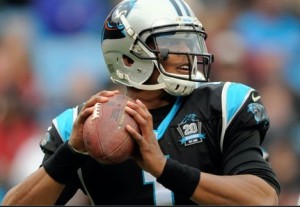Super Bowl 50 armchair quarterbacks are running at full force today, and comments are not so much about the game as they are about one player. And that player isn’t Peyton Manning or Von Miller.
Cam Newton critics are loud today.
Newton’s Law ruled throughout the 2015 football season. With every dab and loud celebration, he said he was simply true to himself. He made no apologies to those that criticized him for his Super Man cleats and giving kids footballs after Carolina Panthers’ scores at home.

Then came the Super Bowl 50 postgame press conference when Cam behaved badly after his Panthers lost to the Broncos 24-10. He arrived to speak to the media dejected, dressed in a hoodie, answered a couple of questions with a word or two and abruptly left the stage. He’s been called classless, a sore loser and lots of other things not fit for family print.
As someone that coaches sports public relations circles, I have thought a lot about the postgame Cam crash. More intriguing to me are thoughts from peers – fellow PR specialists.
Sue Zoldak, Vice President of LEVICK, said, “I think it is pretty unfair of the ecosystem – media and fans – to treat professional athletes as if they are robots programmed to deliver on a good (i.e. provide entertainment value). The Super Bowl is the biggest day in the lives of these humans and for many, a one-time chance to live a life-long dream. That’s a lot of pressure.
“And whether there is self-induced pressure that’s introduced it’s not something that we should punish someone for after the fact. Isn’t that what we want as viewers?”
I saw a comment from Brian Gleason on Twitter Sunday night, which rang a bell in my own PR mind, and asked him to elaborate.
“Cam is still a young athlete in terms of his professional career,” said Gleason, Vice President of Marketing for Previnix. “I’ve been around several professional athletes that really struggled with the media early in their careers, especially when facing criticism after tough playoff losses. I’ve then seen those same athletes learn and grow, and become great examples of how to handle the media professionally later in their careers.”
My take is similar to Zoldak’s and Gleason’s. I certainly think Newton should have acted more professionally, but that doesn’t lie entirely on his lap after his first Super Bowl loss. While it was reported that Panthers’ offensive coordinator Mike Shula and quarterbacks coach Ken Dorsey tried to get Newton’s attention for him to remove the hood from his head before he started to speak but were unsuccessful, I think that preparation for such an outcome should have started the day he arrived in Charlotte, N.C. and continued in the months and days prior to the Super Bowl. And maybe it did and Newton was just that upset. Add to that, the postgame setup at the Super Bowl that had him within earshot of a Broncos player talking about their game plan to dismantle Newton.
Could have been worse
Newton is the face of the Panthers. He’s a newly crowned NFL MVP. He’s not new to the spotlight for anyone that knows his college and professional careers. He should have been better dressed; more prepared and handled his postgame press conference professionally. That said, I would not crucify him for one episode of poor conduct. No one was hurt, arrested or worse.
Therein lies the importance for preparation, Zoldak said.
“I think players, especially the face of a team like the star quarterback, should be given more support from his organization than it appears that Newton had from a media relations front,” Zoldak said. “That means spokesperson training year-round, a before game ‘murder board’ session where the worst possible scenario is rehearsed, a before-the-interview pep talk and final prep session, a spokesperson on stage or nearby who can help answer or defer questions and step in if the player is too emotional to speak.”
Newton’s emotions were on overdrive and he may not have responded to or he may have even tuned out a pre-interview pep talk, but a team’s public relations staff has to try. And again, maybe it did. None of us in this post know.
The situation could have certainly ended worse for Newton. I’d rather see him leave the podium early instead of fuming to the point where he said something that would haunt his team and him in every press session for the rest of his career.
I said last night that I believe that Newton has grown publicly since the beginning of his professional football career and he’s a work-in-progress. He’s had highs and lows, but playing a game on the biggest world sports stage has a greater learning curve for some. I think Newton has a responsibility to be more cordial than he was last night, but I hope and believe that he will look back on and work to improve himself for the future. Gleason agrees.
“While Cam didn’t handle himself well in the post-game, he’ll learn and grow from this, and I’d suspect in several years we’ll be gushing about his professionalism,” Gleason said.
Newton missed an opportunity to be a standup team guy who answers every question after a tough loss. He may have even sullied chances for bigger endorsement opportunities in the short term because of the public outcry after the presser.
I’m pulling for him to be better. He’s loaded with physical talent, but even like some of us several years older, he’s growing. I hope the Panthers provide him the media coaching that he needs, and he vows to represent his team and the NFL professionally in the future.
Until then, I’m giving him a mulligan.
###